WARNING -- THE CAUSE IS NOT A MISSING FILE -- ALL THREADS ARE CALLING THE SAME SCRIPT FILE
I am starting 5-6 threads that call a local script in a Red Hat box.
I've noticed that sometimes, I get the following error message
couldn't read file "/home/leo/myScript.exp": no such file or directory
Obviously, all processes are executing the script, so it seems to be something related to [1] OS has some restriction on simultaneous processes that can run a script or access a file for reading or [2] Java is trying to perform some operation in some stream that is not ready (I was assuming that commons-exec would take care of this for me)
Here's the code
ByteArrayOutputStream outputStream = new ByteArrayOutputStream();
CommandLine commandline = CommandLine.parse("/home/leo/myScript.exp");
DefaultExecutor exec = new DefaultExecutor();
PumpStreamHandler streamHandler = new PumpStreamHandler(outputStream);
exec.setStreamHandler(streamHandler);
try {
exec.execute(commandline); <<< error happens here
}catch(IOException io) {
throw new Exception("");
}
If the error is [1], then I'd like to know how to relax this restriction in the linux OS
If the error is [2], then I'd like to know how do I tell commons-exec to wait for the resource to be ready (in the worst case I'll just add some retries, but I think this is not very elegant)
If the error is something else, at least knowing the cause will be good enough for me to find some solution.
UPDATE - March 15th
Well, here's the thing.
The script is an expect script that uses a library to call a Java class.
One thing I've noticed is that the script goes well until it calls a java method that creates a database connection.
Because the number of threads is low (3~5) I don't think it's a problem in the database. Instead, it seems to me that something is blocking the script to be called while the java code is being called and/or while the java code is creating the database connection.
I am still trying to get the exact exception, but the expect script looks like this (kind of)
#!/opt/tclblend/bin/expect -f
set edfDir "/usr/local/nssa/bin/edf";
set env(LD_LIBRARY_PATH) "/opt/tclblend/lib/tcljava1.4.1"; # for tclBlend
## always use absolute paths
set env(TCL_CLASSPATH) "/home/leoks/EclipseIndigo/workspace2/xyzJavaWrapper/bin";
set env(CLASSPATH) {/home/leoks/EclipseIndigo/workspace2/xyzTomEE/lib/commons-logging-1.1.1.jar:/home/leoks/EclipseIndigo/workspace2/xyzConfiguration/lib/commons-configuration-1.9.jar:/home/leoks/EclipseIndigo/workspace2/xyzConfiguration/lib/commons-lang-2.4.jar:/home/leoks/EclipseIndigo/workspace2/xyz/3rdPartyJDBCJars/ojdbc6.jar:/home/leoks/EclipseIndigo/workspace2/xyzJavaWrapper/lib/commons-dbutils-1.5.jar:/home/leoks/EclipseIndigo/workspace2/xyzJavaWrapper/tcl/tcllib/xyzConfiguration.jar};
source $edfDir/lib/statics.tcl;
source $edfDir/lib/acclib.tcl;
package require java
java::import com.abc.xyz.legacydriver.TCLDriverWrapper
java::import com.abc.xyz.legacydriver.LegacyDriverTaskInputData
java::import com.abc.xyz.legacydriver.LegacyDriverTaskEnum
set ticket [ lindex $argv 0 ];
set inputData [ java::call com.abc.xyz.legacydriver.TCLDriverWrapper pullNextInputData $ticket ]
where pullNextInputData looks like
public static LegacyDriverTaskInputData pullNextInputData(String token) throws Exception {
try {
return pullNextInputDataImpl(token);
} catch (Exception e) {
e.printStackTrace();
throw e;
}
}
private static LegacyDriverTaskInputData pullNextInputDataImpl(String token) throws Exception {
Connection conn = null;
try{
conn = new TCLDriverWrapper().getConnection();
QueryRunner run = new QueryRunner();
ResultSetHandler<LegacyDriverTaskInputData> rsh = new BeanHandler<LegacyDriverTaskInputData>(LegacyDriverTaskInputData.class);
LegacyDriverTaskInputData inputData = run.query(conn,"select * from LegacyDriverTask where id = ?",rsh,Long.valueOf(token));
return inputData;
} catch (ClassNotFoundException e) {
e.printStackTrace();
throw e;
} catch (SQLException e) {
e.printStackTrace();
throw e;
} finally {
DbUtils.close(conn);
}
}
and getConnection() is just a regular driver instantiation code like (it uses apache dbutils)
private Connection getConnectionImpl() throws Exception{
Class.forName("driver name");
Properties props = new Properties();
props.put("user", UtilConf.getProperty("javawrapper.user"));
props.put("password", UtilConf.getProperty("javawrapper.password"));
return DriverManager.getConnection(UtilConf.getProperty("javawrapper.jdbc"), props);
}
As soon as I get a stacktrace, I'll put it here
UPDATE - March 16th
The stacktrace does not say much :-(
2016-03-17 01:49:10,034 INFO [QProcessor] Threads started (ok=0 nok=0 wait=0) org.apache.commons.exec.ExecuteException: Process exited with an error: 1 (Exit value: 1)
at org.apache.commons.exec.DefaultExecutor.executeInternal(DefaultExecutor.java:404)
at org.apache.commons.exec.DefaultExecutor.execute(DefaultExecutor.java:166)
at org.apache.commons.exec.DefaultExecutor.execute(DefaultExecutor.java:153)
at com.ericsson.xyz.tomee.q.QWorker.onMessageImpl(QWorker.java:776)
at com.ericsson.xyz.tomee.q.QWorker.onMessage(QWorker.java:303)
at sun.reflect.NativeMethodAccessorImpl.invoke0(Native Method)
at sun.reflect.NativeMethodAccessorImpl.invoke(NativeMethodAccessorImpl.java:57)
at sun.reflect.DelegatingMethodAccessorImpl.invoke(DelegatingMethodAccessorImpl.java:43)
at java.lang.reflect.Method.invoke(Method.java:606)
at org.apache.openejb.core.interceptor.ReflectionInvocationContext$Invocation.invoke(ReflectionInvocationContext.java:182)
at org.apache.openejb.core.interceptor.ReflectionInvocationContext.proceed(ReflectionInvocationContext.java:164)
at org.apache.openejb.monitoring.StatsInterceptor.record(StatsInterceptor.java:180)
at org.apache.openejb.monitoring.StatsInterceptor.invoke(StatsInterceptor.java:99)
at sun.reflect.GeneratedMethodAccessor106.invoke(Unknown Source)
at sun.reflect.DelegatingMethodAccessorImpl.invoke(DelegatingMethodAccessorImpl.java:43)
at java.lang.reflect.Method.invoke(Method.java:606)
at org.apache.openejb.core.interceptor.ReflectionInvocationContext$Invocation.invoke(ReflectionInvocationContext.java:182)
at org.apache.openejb.core.interceptor.ReflectionInvocationContext.proceed(ReflectionInvocationContext.java:164)
at org.apache.openejb.core.interceptor.InterceptorStack.invoke(InterceptorStack.java:80)
at org.apache.openejb.core.stateless.StatelessContainer._invoke(StatelessContainer.java:212)
at org.apache.openejb.core.stateless.StatelessContainer.invoke(StatelessContainer.java:181)
at org.apache.openejb.core.ivm.EjbObjectProxyHandler.synchronizedBusinessMethod(EjbObjectProxyHandler.java:268)
at org.apache.openejb.core.ivm.EjbObjectProxyHandler$1.call(EjbObjectProxyHandler.java:253)
at org.apache.openejb.async.AsynchronousPool$AsynchronousCall.call(AsynchronousPool.java:110)
at java.util.concurrent.FutureTask.run(FutureTask.java:262)
at java.util.concurrent.ThreadPoolExecutor.runWorker(ThreadPoolExecutor.java:1145)
at java.util.concurrent.ThreadPoolExecutor$Worker.run(ThreadPoolExecutor.java:615)
at java.lang.Thread.run(Thread.java:724)
